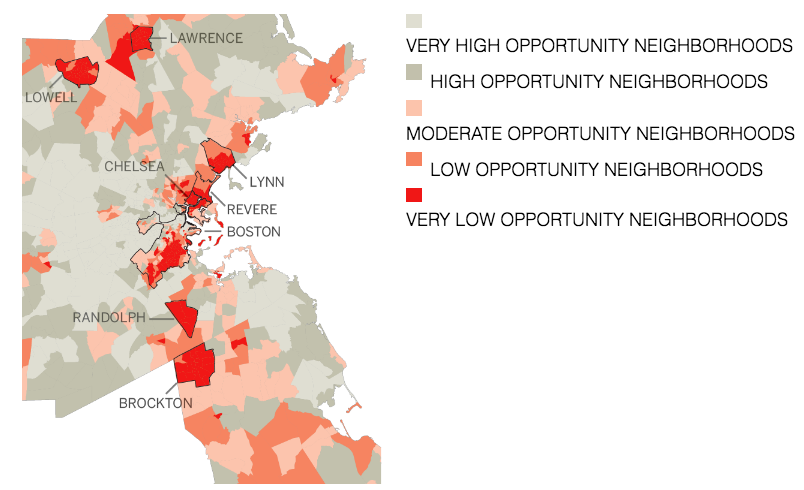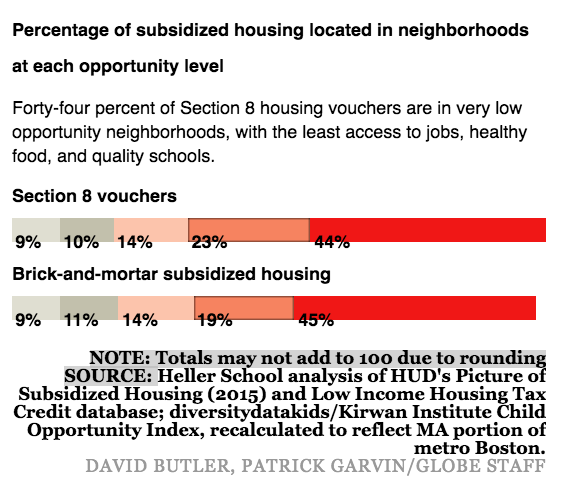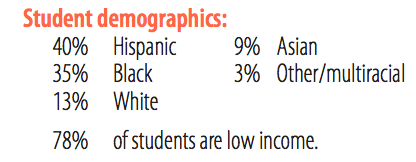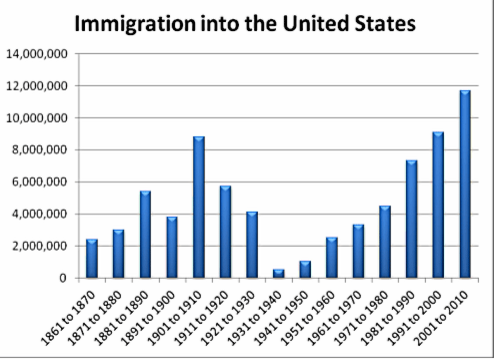Why I'm voting No on Question 5 (CPA tax surcharge)
Eva Webster
Remember if this is passed Property taxes will increase again. There is not any "affordable housing" and this will make it worse. Landlords pass tax increases along to tenants and home owners without (or even with) tenants are having a hard time with the cost of living in Boston. I will vote NO.Dave



I’m sure someone will deride me for that, but I think that the US has too many poor people because of its own policies. You have to ask yourself, why does Boston have so many needy people? Liberal policies claim benevolence, compassion, and fairness — but in reality, and paradoxically, they produce growing numbers of poor folks. In the old days, working class men had no choice but to learn a skill (those craftsmen of the old days!), and to form strong families, in order to survive and ensure their kids survival — now people can just walk away from, or avoid any personal responsibility, and the taxpayers will pick up the tab.

Dave
Sent from my iPhone
On 10/19/16, 9:32 AM, "David Strati" <allstonbr...@googlegroups.com on behalf of da...@uniformsforamerica.com> wrote:Remember if this is passed Property taxes will increase again. There is not any "affordable housing" and this will make it worse. Landlords pass tax increases along to tenants and home owners without (or even with) tenants are having a hard time with the cost of living in Boston. I will vote NO.DaveThanks, Dave, for speaking out your mind. It’s good to know I’m not alone on this (although I think we may be actually a silent majority in A-B). Still, reasonable people can disagree, and others believe they should vote Yes on the CPA question.But for those who may be sitting on the fence, I’d like to share some information and additional thoughts. Take this, for example (this happened just last month):Fwd: Mayor Walsh Makes $14 Million Available for Affordable Housing - Spare Change NewsQuote from the article: “The $14 million is part of Walsh’s goal to create 6,500 new units of affordable housing by 2030, the Mayor’s office said. So far Walsh has made $70 million available for affordable housing.”Keep in mind that those dollar figures do not include state subsidies for low-income affordable housing (which come from our taxes even if the money is borrowed via state bonds), or the amounts by which market-rate homebuyers in Boston effectively subsidize on-site affordable units in most new developments — since the prices of market-rate units are set higher to offset the cost of affordable units.In any case, Boston does have money available for affordable housing (not to be confused with market-rate affordable housing, which the CPA does not address) — and I believe that more money could be found without additionally taxing existing housing via the CPA.I have heard from a City Hall insider that the DND (Dept. of Neighborhood Development, which deals with low-income housing) has proposed to the Mayor other (non-CPA) ways to raise funds for more affordable housing — for example, by putting a surcharge on sales of luxury units to non-residents/foreign investors (as the City of Vancouver has done) – and the Mayor has had a positive reaction to that proposal, and it is currently being studied.Clearly, the Mayor’s plan to create 6,500 new units of affordable housing in the next 13 years is not contingent on the CPA. However, the more money is available for low income housing from all kinds of sources, the more units can be built by low-income housing developers (like the CDCs for example) — leading to more low-income people making Boston their home.The argument that some people make that the CPA tax surcharges would be relatively small for many homeowners in Boston (those who own/live in small units — yes; those who live in free-standing homes whose values are increasing rapidly – not so small), is overall irrelevant. That argument also undermines the rationale for having the CPA as a vehicle for low income affordable housing in Boston — since CPA-generated revenue is too small and cannot make any difference a long as the numbers of people vying for affordable housing continues to rise — which the current city, state and federal policies pretty much ensure.Boston’s immigrant populations grows 20 percent from 2000 to 2014 - The Boston GlobeHalf of Boston Residents Earn Less than $35,000 a YearOf course, no one dares to ask the politically sensitive question “Should we be going even farther in that direction?” — because you might be called a racist, a xenophobe, a snob, or some other such thing.To get to the point: The goal for a city like Boston should be to have true economic diversity that includes a strong middle class. We don’t have it. Things are getting shaky on that front — we are definitely becoming a city of primarily the rich and the poor.Therefore, in my opinion, Boston City Hall should not be favoring and actively supporting one category of residents (often newcomers who don’t pay any taxes in the city, and already benefit from various federal/state/city-funded benefits) against another and more threatened category: middle-class & low-income, or otherwise struggling, homeowners who ARE paying taxes in Boston, whose numbers are dwindling, and their interests are getting progressively ignored and neglected.It’s a well known fact that Boston has more affordable (low-income) housing than any of the surrounding communities (which is why the city is exempt from the 40B legislation that promotes affordable housing creation throughout the state). You may wonder how much low-income housing Boston has in comparisons to the leafy suburbs — and fortunately, I’ve got something to illustrate that.After opening this link: http://www.bostonglobe.com/metro/2016/09/02/boundaries-hope/m15ni02g8atfGwg4R9z7cI/story.html , about half way down, you can see a map of Greater Boston/Eastern Mass. (I pasted it below). Note the large concentration of red and reddish tones in Boston, which signify large amounts of low-income/subsidized housing, while the grey areas have very little or none. Additionally, the red & reddish colored areas are considered “low opportunity” neighborhoods for educational and economic advancement, while the grey areas signify “high opportunity” for advancement.
<4DCA8AEC-F54F-4790-ADDA-96814D5368C9.png><C8A34719-BEC8-4ADC-87A8-C66BAF92F189.png>
So if we keep building more and more low-income affordable housing in Boston neighborhoods, it just gets the surrounding well-to-do towns off the hook — and their residents who directly or indirectly often benefit from labor of low-income people can stay safely insulated from having low-income families living in their towns — while Boston is getting a continuously higher concentration of low-income folks (which produces a range of consequences to our city and residents).And generally, the more housing development of any kind is getting built in Boston, the less housing is getting built elsewhere in Greater Boston.Housing boom isn¹t hitting Boston suburbs - The Boston Globe
So why exactly should I as a resident of Boston be in favor of densification (via CPA funded low-income housing or otherwise) which eradicates open/green space in my city/neighborhood — while other nearby towns remain leafy, airy, quiet, and wonderful to live in?Also, the CPA in Boston opens the door to additional taxation of regular homeowners who in many cases are barely holding on.Imagine a middle-income family with small children that was able to buy a house or condo in one of Boston’s neighborhoods — and their mortgage payments, taxes, insurance, maintenance costs, and rising healthcare, food, and transportation costs deplete the working spouse’s paycheck — while the other spouse is trying to stay at home to take care of the children and the household (or works only part time). They also need to be saving for retirement, children’s eduction, may still have their own student debt, and additionally may be burdened with caring for elderly parents.Those types of people — and even two-income families in Boston — often have no money to spare. They themselves are a dying breed/oppressed minority in this city — and just because they are homeowners, they should not be forced to contribute to low-income people’s housing — especially since Boston residents (unlike the folks in the leafy suburbs whose zoning protects them) have absolutely no say in who, and in what numbers, can move into the city.The powers that be should be asking themselves how many poor people can this city/state/country continue to provide tax-payer benefits to, before the middle-class golden goose is killed (and the middle class folks discretionary spending power that fuels the economy is killed with them). If we have policies that actually increase the numbers of poor/dependent people — how can we ever hope to have quality affordable healthcare and education, or a 21st century public infrastructure?An uncomfortable question that remains unanswered is how much affordable housing Boston needs in view of the fact that the need for affordable housing can never be satisfied — because more and more needy/disadvantaged people can always move to Boston (from other cities, states, and countries) and ask to be housed affordably. And they can also put their kids in BPS schools, which are already off-balance in terms of student demographics (with $18,000 per year cost per pupil).
<DF48A480-B02B-43BB-8E0F-A34ED3773AEC.png>
Source: BPS at a Glance 14-0502.pdfAs a long-term Boston resident, I see the city becoming attractive and hospitable to two categories of people — the wealthy (who can afford to send their kids to private schools), and low-income folks — with the middle falling out.I feel very strongly that Boston’s middle class residents/families, those who can’t afford luxury housing and private schools, and do not qualify for low-income affordable housing (but often struggle economically nevertheless), are under siege and practically being pushed out of the city — by relentless development pressures, by rising taxes and other housing costs, by increasing congestion, by the loss of green space, by people finding themselves in neighborhoods that are economically segregated, and by public schools that reflect racial and economic divides (with minorities and low-income kids predominating — and obviously this is not something that benefits any of those kids).For my entire life, up until now, I have had very strong progressive/liberal leanings, and favored downward wealth distributive policies — but now I think I am becoming some kind of a “post-liberal”. I see that there is a limit to the effectiveness of liberal policies. All charity has its limits — when a certain line is crossed, there are unintended consequences. For example, hit on the rich people too hard, and they will move elsewhere. Overtax and neglect the middle class while it is burdened with high housing, educations and healthcare costs, and you will lose it too. Open the doors to poverty, and it will come.I consider myself a compassionate person — but I’m also trying to be rational and thoughtful — and any rational and thoughtful person needs to weigh in the consequences of various actions. Social welfare and a decent safety net are needed in Boston, Massachusetts, and the US — but if it becomes the Number 1 goal in itself (instead of doing everything we can to reduce the numbers of people who rely on that system), the growing demand for benefits undermines the system .The more social welfare we provide, the more welfare recipients we attract from other states and from beyond our borders — and the more we need to expand the system. It’s a vicious circle. Poor people need subsidized housing, education, healthcare, eldercare, food assistance, policing, and so on. It all costs a lot of money in taxpayers subsidies/funding. It’s only natural that the areas which offer generous benefits are magnets for people who desire those benefits.
I’m sure someone will deride me for that, but I think that the US has too many poor people because of its own policies. You have to ask yourself, why does Boston have so many needy people? Liberal policies claim benevolence, compassion, and fairness — but in reality, and paradoxically, they produce growing numbers of poor folks. In the old days, working class men had no choice but to learn a skill (those craftsmen of the old days!), and to form strong families, in order to survive and ensure their kids survival — now people can just walk away from, or avoid any personal responsibility, and the taxpayers will pick up the tab.Both parties appear to be under the thumb of Big Business, and to ensure cheap labor, they have been allowing excessive immigration — which undercuts working people’s leverage in negotiating for higher wages ( https://www.numbersusa.com/ ).
<E692DD11-7645-4C1D-9341-9EAF76D7F06A.png>
Creating a stable and healthy welfare state — and a reliable, strong social safety net for all citizens — can only work and succeed in reducing poverty if the country is not at the same time allowing a continuous large influx of immigrants (legal, illegal, refugees, doesn’t matter) from poorer countries — and their numbers exceed the number of good jobs that are getting created. Off-shoring, “free” trade, automation and other shareholders pressure to lower business/production costs, lead to fewer jobs — but our immigration keeps growing. It makes no sense. I think this is directly responsible for many Americans’ lower standard of living than their parents had.Lastly, my thinking about the CPA question in Boston is also colored by the fact that there are already various forces in motion that aim to dip deeper into working people’s pockets (see just a few links below; but there are many more reasons why people’s disposable incomes are shrinking). I’m concerned that those actions/efforts cumulatively are/will be making the middle-class golden goose sicker and sicker.Economists push state to raise taxes - The Boston GlobePremiums soar 21% for popular health plan - The Boston GlobeRising Health Care Costs in MA and Consumers_final.pdfCity to consider raising parking meter rates - The Boston Globe
--
To post to this group, send email to AllstonBr...@googlegroups.com
For more options, visit this group at http://groups.google.com/group/AllstonBrighton2006?hl=en
---
You received this message because you are subscribed to the Google Groups "AllstonBrighton2006" group.
To unsubscribe from this group and stop receiving emails from it, send an email to allstonbrighton...@googlegroups.com.
For more options, visit https://groups.google.com/d/optout.
<DF48A480-B02B-43BB-8E0F-A34ED3773AEC.png>
<4DCA8AEC-F54F-4790-ADDA-96814D5368C9.png>
<C8A34719-BEC8-4ADC-87A8-C66BAF92F189.png>
<E692DD11-7645-4C1D-9341-9EAF76D7F06A.png>
lizbr...@aol.com
Dear Eva,
I appreciate that you are passionately committed to our neighborhood and are a tireless advocate for more owner occupancy. Housing is a complex issue, and no one approach will work.
I have to disagree with your statement that " if we build more affordable housing more low-income people will make Boston their home".
People are already struggling to house themselves in this housing market. Working people are being displaced by landlords who can charge young professionals $1,000 for a bedroom in two and three family homes.
We need economic diversity in our city. Having low income people living here is not a bad thing. You seem to have an issue with the term affordable. There are different levels of affordability depending on income. Many if the so called affordable units in our new developments are one bedroom or studio apartments, so they may or may not be affordable for a single person, but would not house a family group.
So yes, we have a housing crisis and building more affordable housing for families is a critical part of the solution in addition to building owner occupied condos. I am voting Yes on 5.
Sent from AOL Mobile Mail
